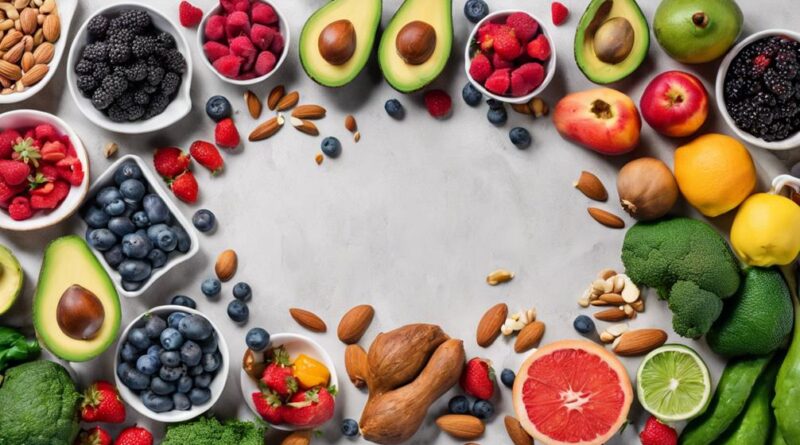Natural Foods Perfect for the Paleo Diet
If you're on the Paleo diet, opt for grass-fed beef, wild-caught salmon, free-range chicken, organic veggies, nuts, seeds, fresh fruits, pasture-raised eggs, and coconut products. Grass-fed beef is leaner and richer in omega-3s; wild-caught salmon is packed with essential fatty acids; free-range chicken offers lean protein. Organic veggies are bursting with nutrients, nuts and seeds are high in healthy fats and protein, while fresh fruits provide essential vitamins. Pasture-raised eggs are nutrient-dense, and coconut products bring MCTs and antimicrobial benefits. These natural foods align well with your Paleo journey and support your health objectives.
Grass-Fed Beef
When following the Paleo diet, opt for grass-fed beef to ensure you're consuming meat from animals that have been raised in their natural environment and fed a diet that aligns with the principles of this eating plan. Grass-fed beef offers numerous benefits compared to conventionally raised beef. It's leaner, higher in omega-3 fatty acids, and contains more antioxidants, vitamins, and minerals like vitamin E, beta-carotene, and zinc. The meat is also free from antibiotics and hormones, making it a healthier choice for you.
Cooking grass-fed beef can be slightly different from cooking conventional beef due to its lower fat content. To enhance the tenderness and flavor of grass-fed beef, consider marinating it before cooking. This can help break down the muscle fibers and add extra moisture. When cooking grass-fed beef, it's best to use gentle heat and avoid overcooking to prevent the meat from becoming tough. Opt for cooking methods like grilling, sautéing, or braising to retain the meat's juiciness.
Wild-Caught Salmon
For optimal health benefits on the Paleo diet, incorporating wild-caught salmon into your meals is a wise choice due to its nutrient-rich profile and sustainable sourcing. Wild-caught salmon is packed with Omega-3 fatty acids, essential for brain function and reducing inflammation in the body. These healthy fats are linked to decreased risk of heart disease and improved overall well-being.
When cooking wild-caught salmon, opt for methods that preserve its nutritional value. Grilling, baking, or broiling are great choices as they retain the Omega-3 benefits without adding unhealthy fats. Avoid deep-frying, as it can diminish the health advantages of this superfood.
Sustainable sourcing is crucial when it comes to wild-caught salmon. Unlike farmed salmon, which can contain contaminants and artificial dyes, wild-caught salmon feeds on its natural diet and lives in its native habitat. This results in a healthier and more environmentally friendly option for your meals.
In addition to Omega-3 benefits, wild-caught salmon is a good source of high-quality protein, vitamins D and B, and minerals like selenium. This powerhouse of nutrients contributes to better skin health, improved brain function, and reduced inflammation in the body. By including wild-caught salmon in your Paleo diet, you aren't only nourishing your body but also supporting sustainable fishing practices.
Free-Range Chicken
To continue enhancing your Paleo diet with nutrient-rich options, consider incorporating free-range chicken into your meals. Free-range chicken, a staple in the Paleo diet, offers a range of benefits such as lean protein, vitamins, and minerals that support overall health and well-being.
Here are some reasons why free-range chicken is a great addition to your Paleo menu:
- Lean Protein Source: Free-range chicken is a fantastic source of lean protein, essential for muscle growth, repair, and overall body function.
- Rich in Nutrients: Free-range chicken is packed with essential nutrients like iron, zinc, and B vitamins, which are crucial for energy production and metabolism.
- Chicken Broth: Utilize free-range chicken to make nutritious chicken broth, a versatile ingredient that can be used in various Paleo recipes to add flavor and nutrients.
- Roasted Chicken: Enjoy delicious roasted chicken dishes that are easy to prepare and can be seasoned with Paleo-friendly herbs and spices for added flavor.
- Versatile Cooking Options: Free-range chicken can be cooked in various ways such as grilling, baking, or sautéing, providing you with versatile meal options to keep your Paleo diet exciting and flavorful.
Incorporating free-range chicken into your Paleo diet not only diversifies your protein sources but also ensures you're consuming high-quality, nutrient-dense food that aligns with the principles of the Paleo lifestyle.
Organic Vegetables
Consider incorporating organic vegetables into your Paleo diet to boost your nutrient intake and support overall health and well-being. Organic vegetables are grown without synthetic pesticides or fertilizers, making them a healthier option compared to conventionally grown produce. They're packed with essential vitamins, minerals, and antioxidants that are beneficial for your body.
When shopping for organic vegetables, consider visiting farmers markets or participating in community gardens. Farmers markets offer a variety of fresh, locally grown organic vegetables that are often harvested at their peak ripeness, ensuring maximum nutrient content. Additionally, buying from farmers markets supports local farmers and promotes sustainable agriculture practices.
Community gardens provide a unique opportunity to grow your own organic vegetables, allowing you to have full control over the cultivation process. By growing your vegetables in a community garden, you can ensure that no harmful chemicals are used in the growing process, providing you with the freshest and most nutrient-dense produce possible.
Including a wide variety of organic vegetables in your Paleo diet can help you meet your daily nutrient requirements while adding delicious flavors and textures to your meals. Whether you source them from farmers markets or grow them in community gardens, organic vegetables are a fantastic addition to a healthy, nutrient-rich Paleo diet.
Nuts and Seeds
Incorporating a variety of nuts and seeds into your Paleo diet provides essential nutrients and adds a flavorful crunch to your meals. Nuts and seeds are nutrient-packed snacks that aren't only delicious but also offer a wide range of health benefits. Here are some reasons why they're excellent additions to your Paleo lifestyle:
- Rich in Healthy Fats: Nuts and seeds are abundant sources of healthy fats like omega-3 and omega-6 fatty acids, which are essential for brain function and reducing inflammation in the body.
- High in Protein: These natural snacks are also rich in protein, making them a great option for maintaining muscle mass and aiding in weight management.
- Loaded with Fiber: Nuts and seeds are high in dietary fiber, promoting digestive health and keeping you feeling full and satisfied for longer periods.
- Packed with Vitamins and Minerals: They're packed with essential vitamins and minerals such as vitamin E, magnesium, and zinc, which play crucial roles in various bodily functions.
- Versatile and Convenient: Nuts and seeds are incredibly versatile and can be easily incorporated into your meals or enjoyed as a quick and convenient snack on the go.
Fresh Fruits
Fresh fruits provide a myriad of essential vitamins and antioxidants crucial for optimal health and well-being. Incorporating seasonal berries into your Paleo diet can offer a burst of flavor along with a range of health benefits. Berries such as strawberries, blueberries, raspberries, and blackberries are rich in antioxidants, particularly vitamin C and flavonoids, which help combat oxidative stress and inflammation in the body.
Tropical fruits are another excellent addition to your Paleo meal plan. Fruits like mangoes, pineapples, and papayas not only satisfy your sweet cravings but also provide essential nutrients. Mangoes, for instance, are abundant in vitamin A and C, while pineapples contain bromelain, an enzyme known for its anti-inflammatory properties. Papayas are packed with enzymes like papain, aiding in digestion and reducing bloating.
When selecting fruits for your Paleo diet, opt for fresh, whole fruits over processed or dried varieties. Fresh fruits retain their natural fiber content, which can help regulate blood sugar levels and promote a healthy gut microbiome. Including a variety of fruits in your daily meals ensures you benefit from a wide array of vitamins, minerals, and phytonutrients essential for overall health and vitality on the Paleo diet.
Pasture-Raised Eggs

Pasture-raised eggs are a nutrient-dense source of protein and essential vitamins, ideal for enhancing your Paleo diet with high-quality nutrients. These eggs aren't only delicious but also offer a range of health benefits that make them a valuable addition to your diet. Here are some reasons why pasture-raised eggs are a great choice:
- Nutrient Rich: Pasture-raised eggs are packed with essential nutrients like vitamin D, vitamin B12, and omega-3 fatty acids, which are important for overall health and well-being.
- Protein Packed: With a good amount of high-quality protein, pasture-raised eggs can help you feel full and satisfied, making them a great option for breakfast or any meal of the day.
- Higher Omega-3 Content: Compared to conventional eggs, pasture-raised eggs tend to have higher levels of omega-3 fatty acids, which are known for their anti-inflammatory properties.
- Lower in Saturated Fat: Pasture-raised eggs generally contain lower levels of saturated fat compared to eggs from caged hens, making them a heart-healthy choice.
- Richer Yolk Color: The yolks of pasture-raised eggs are typically darker and richer in color, a sign of higher nutrient content like carotenoids and antioxidants.
Including pasture-raised eggs in your Paleo diet can provide you with a range of nutrients and benefits that support your overall health and well-being.
Coconut Products
For a versatile addition to your Paleo diet that offers a range of health benefits, consider exploring coconut products. Coconut oil is a staple in Paleo cooking due to its numerous benefits. It contains healthy fats like MCTs (medium-chain triglycerides), which can help with weight management and provide a quick source of energy. Additionally, coconut oil has antimicrobial properties that may support gut health. You can use coconut oil in various recipes, from sautéing vegetables to making homemade Paleo mayonnaise or salad dressings.
When it comes to baking on a Paleo diet, coconut flour is a popular choice. It's gluten-free and grain-free, making it suitable for those with dietary restrictions. Coconut flour absorbs more liquid than traditional flours, so be sure to adjust your recipes accordingly by adding more eggs or liquid ingredients. For baking success, consider combining coconut flour with other Paleo-friendly flours like almond flour or tapioca flour to improve texture and structure. If you prefer to avoid coconut flour, alternatives like almond flour, cassava flour, or arrowroot flour can be used in Paleo baking recipes.
Incorporating coconut products into your Paleo diet can enhance the flavor of your dishes while providing valuable nutrients and health benefits. Whether you're cooking with coconut oil or experimenting with coconut flour in baking, these versatile products are excellent additions to a Paleo lifestyle.
Conclusion
In conclusion, incorporating natural foods like grass-fed beef, wild-caught salmon, free-range chicken, organic vegetables, nuts and seeds, fresh fruits, pasture-raised eggs, and coconut products into your diet aligns perfectly with the principles of the paleo diet.
These nutrient-dense options provide a variety of essential vitamins, minerals, and healthy fats to support overall health and well-being.
Making these choices can help you thrive on a paleo lifestyle.
